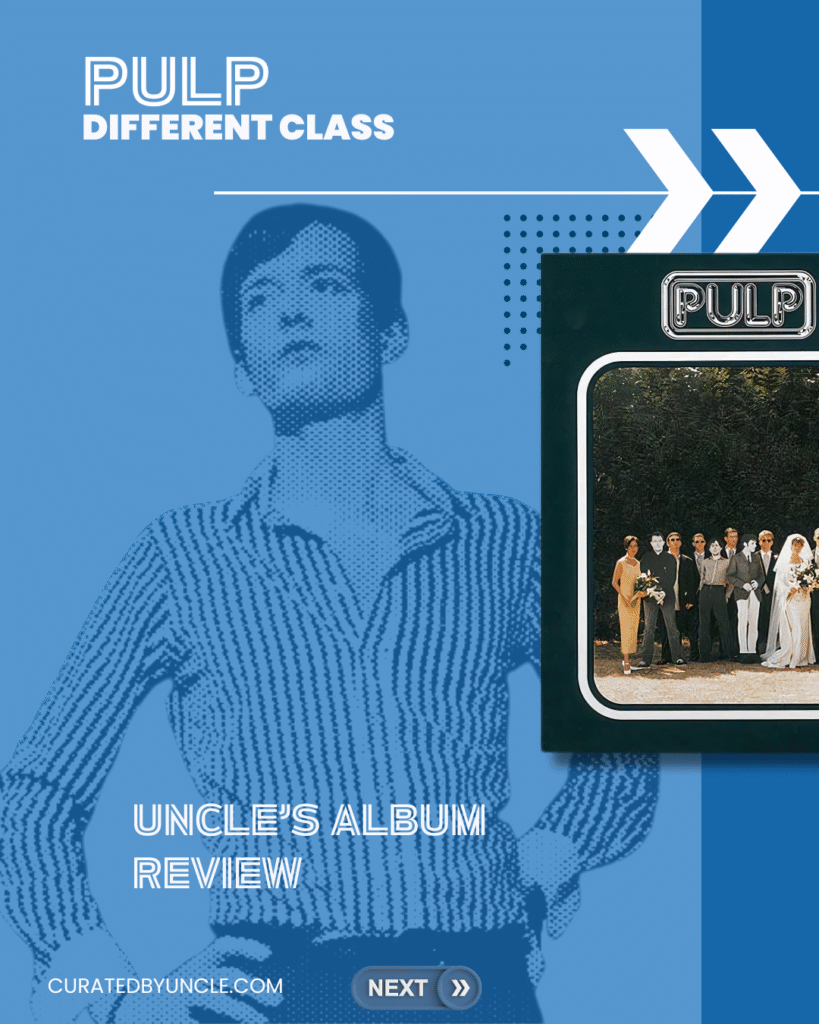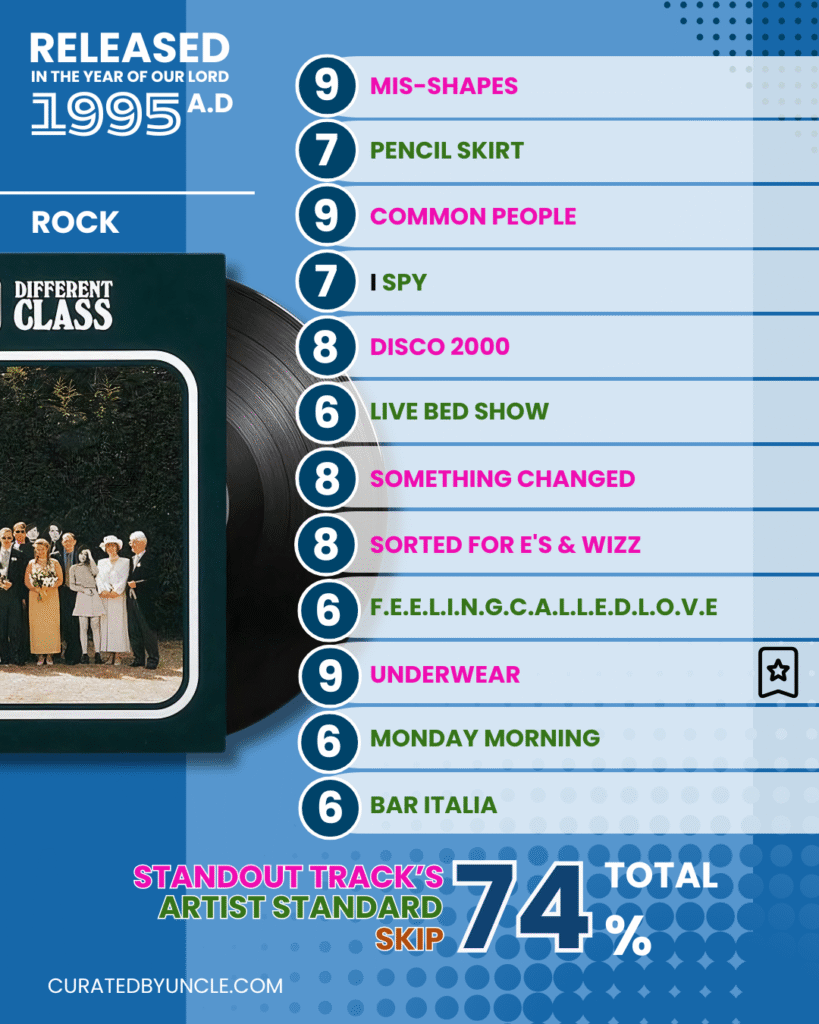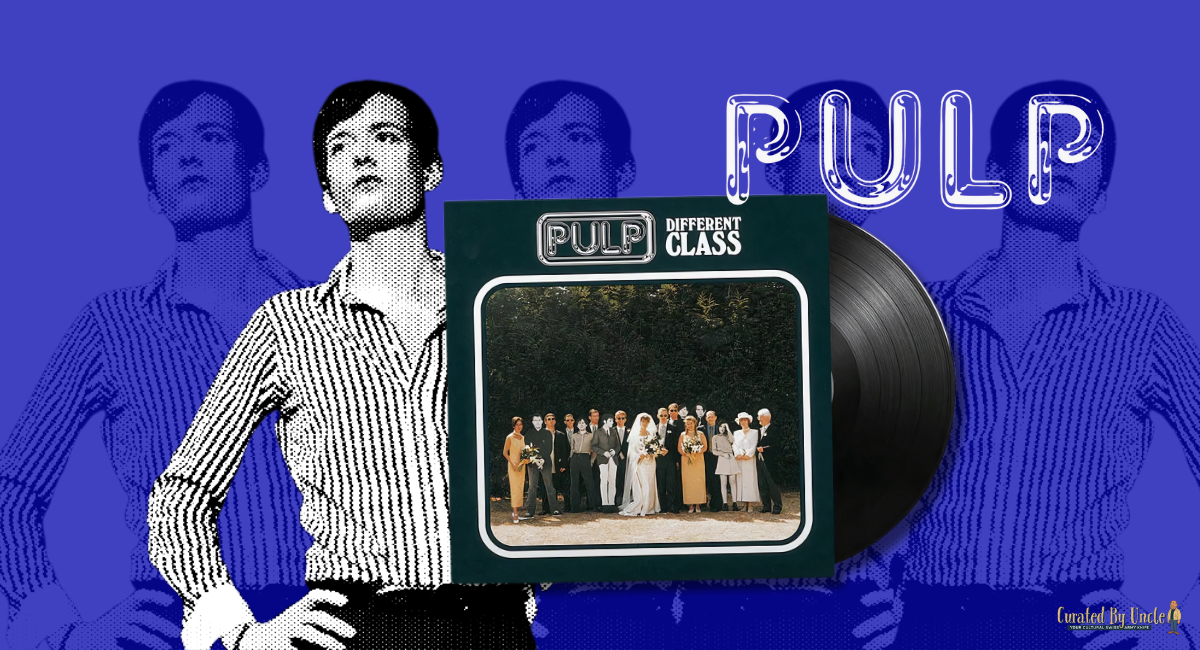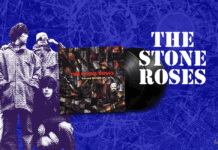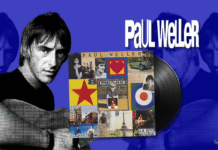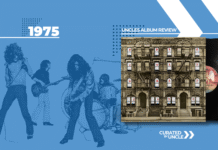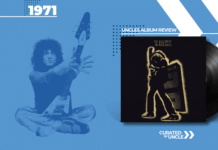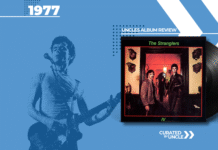Welcome to the Kitsch-Soaked K-hole
I remember hearing Different Class for the first time in a mate’s grimy bedroom with posters peeling off the wall and the smell of instant noodles lingering. It was like getting slapped in the face with a disco ball by someone quoting Marx. It sounded like nothing and everything: sarcastic, horny, furious and wearing second-hand trousers.
Released in 1995, right in the sweaty armpit of Britpop, Pulp’s Different Class wasn’t just an album, it was a social event. A working-class Trojan horse infiltrating middle-class parties with tales of council estate lust, shame and revenge. If Oasis were shouting from the pub and Blur were sniggering behind the bike sheds, Pulp were peering in your bedroom window and taking notes.
Table of Contents
Meet the Council Estate Avengers
This wasn’t just the Jarvis Cocker Show (though, to be fair, he does own the patent on ‘sexually awkward messiah’). The lineup for Different Class was a band of finely tuned misfits who somehow made cynicism funky.
- Jarvis Cocker – vocals, lanky charisma and more quotable lines than your GCSE anthology.
- Steve Mackey – bass guitar; strutting, melodic and sadly departed in 2023.
- Candida Doyle – keyboards; added the sugar to Jarvis’ arsenic.
- Mark Webber – guitar; minimalistic but effective, the quiet art-student type.
- Nick Banks – drums; held it all together like gaffer tape on a leaky radiator.
They were weird, tight, stylishly unfashionable and sounded like no one else.
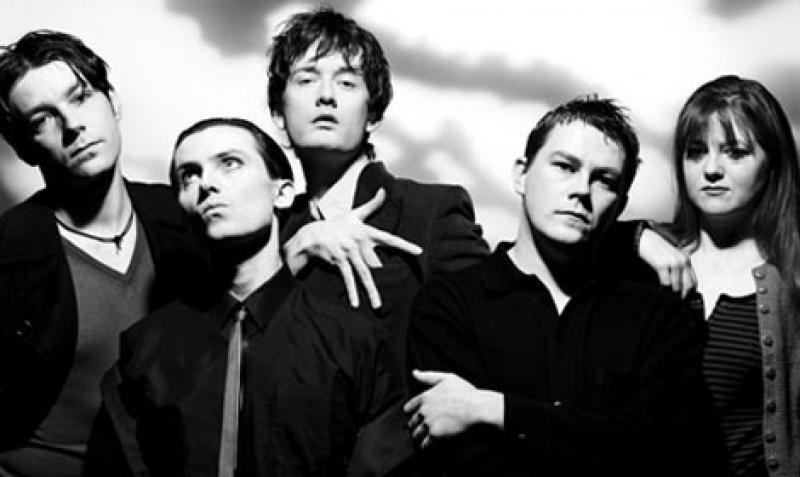
The Man With the Specs: Jarvis Bloody Cocker
Jarvis Cocker isn’t just a frontman, he’s a one-man kitchen sink drama. Tall, twitchy and armed with a vocabulary most pop stars would choke on, he turned voyeurism into poetry. While Blur pretended to be middle-class and Oasis bragged about working-class pride, Jarvis actually lived the awkwardness of social climbing and the grubby reality of wanting more.
He doesn’t sing so much as narrate a never-ending confessional, equal parts satire, filth and heartbreak.
Track-by-Track: Cheap Suits, Big Feelings
1. Mis-Shapes
The album kicks off like a Molotov cocktail in a cardigan. It’s a rallying cry for every outcast who’s ever been told to shut up and fit in. With snarling confidence, Jarvis flips the script, inviting the ‘mis-shapes’ and ‘mistakes’ to not only take over the disco but redecorate it with bad taste and brutal honesty.
2. Pencil Skirt
Equal parts erotic and embarrassing, it’s like being seduced and humiliated at the same time. Jarvis delivers every line with the sly sleaze of someone confessing sins they’re oddly proud of. A tale of imbalance in power and libido, it’s sexy until it’s suddenly pathetic and then sexy again.
3. Common People
If you’ve ever been patronised by someone with a trust fund and an ironic tote bag, this one hits home. It’s a brilliant takedown of class tourism, delivered with such righteous rage and fist-pumping energy you’d think Jarvis was running for Prime Minister of the Underdogs.
4. I Spy
This one oozes menace. Over a creeping beat, Jarvis plays the voyeur turned avenger, documenting his rise from sneered-at outsider to bedroom revolutionary. It’s Bond villain monologue meets kitchen sink drama, equal parts theatre and threat, with enough wit to make it sting.
5. Disco 2000
Nostalgia done right. This track takes teenage longing, wraps it in glitter and sends it spinning into the future. Euphoric but aching, it’s about the one who got away, or never arrived. If you haven’t googled an old flame at 2AM, are you even alive?
6. Live Bed Show
A crumbling relationship seen through the metaphor of a disused bed. Depressingly brilliant, it captures that domestic decay we pretend not to notice. It’s quiet and heartbreaking, like watching someone slowly forget what love felt like, while still doing the washing up.
7. Something Changed
Surprisingly sincere, it strips away the sarcasm to reveal a rare bit of emotional nudity. It’s about fate and the tiny coincidences that shape lives. Lovely, understated and possibly the only track where you might consider hugging Jarvis instead of dodging him.
8. Sorted for E’s & Wizz
It begins in dreamy haze and ends with existential panic. A perfect encapsulation of the ‘90s rave scene, complete with blurry memories and blurry morals. Jarvis doesn’t preach, he observes, like a bemused outsider accidentally high at a warehouse party.
9. F.E.E.L.I.N.G.C.A.L.L.E.D.L.O.V.E.
Twitchy and neurotic, this is love as confusion, not comfort. Jarvis picks apart emotion like a suspicious letter. The minimal groove and internal monologue create something claustrophobic and fascinating, like being locked in a cupboard with your feelings.
10. Underwear
That awkward, breathless space after a sexual encounter where intimacy turns to introspection and you really should leave but you haven’t found your socks. It’s messy, human and oddly sweet in its naked vulnerability (pun intended).
11. Monday Morning
Here’s the hangover anthem. A hymn for the disillusioned office worker, this track nails the despair of routine. It’s synthy, snarky and brutally relatable if you’ve ever cursed your alarm clock while questioning your entire life.
12. Bar Italia
The final stumble through a hazy morning after. All the bravado’s gone, all that’s left is a greasy spoon, a splitting headache and fragile connection. It’s tender, knackered and perfectly imperfect – like the emotional equivalent of strong tea and sunglasses.
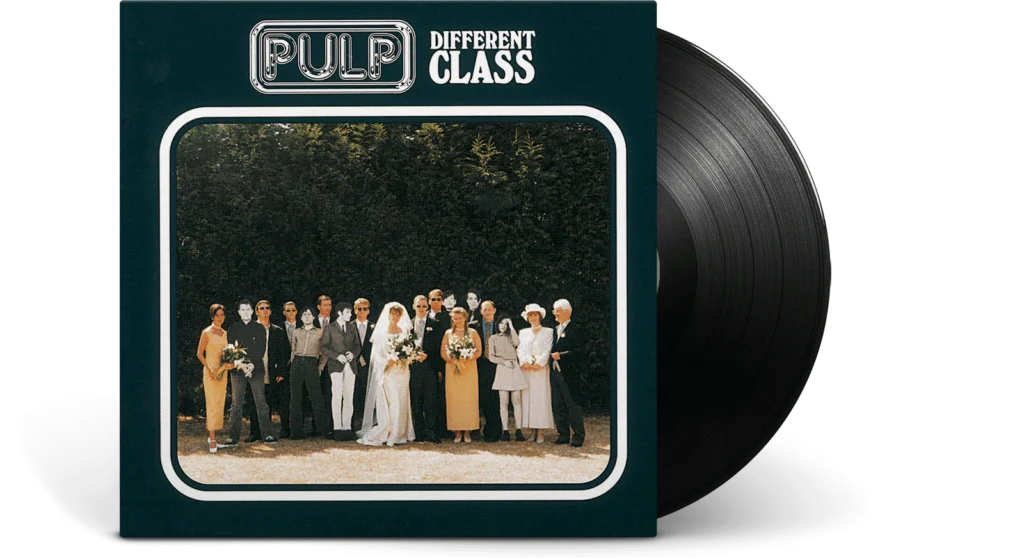
Production: Grit in a Glitter Wrapper
Different Class was produced by Chris Thomas, who managed to balance the glitz of Britpop with the grit of real life. It’s polished, but only just – like a rhinestone on a bin lid. Recorded mainly at The Town House in London, the sound is sharp, theatrical and deliberately chaotic in places.
Every instrument has room to breathe and yet it all hangs together like a drunken conga line that somehow doesn’t fall over.
Themes: Class, Sex, Shame and Getting Away With It
Where do we start? Different Class is obsessed with class mobility, emotional dislocation, lust, revenge and unflattering lighting. Jarvis Cocker skewers privilege not with anger, but with sarcasm sharp enough to cut glass.
Sex isn’t glamorous here, it’s awkward and occasionally mortifying. Relationships are messy. Youth is a minefield. This album’s brilliance lies in its brutal honesty.
Trivia: Impress Your Britpop Snob Mates
- Jarvis Cocker famously handed out different cover art options with the album, hence the title Different Class.
- The spoken word bit on “Sorted for E’s & Wizz” caused moral outrage in UK tabloids. Of course it did.
- “Common People” was inspired by a real woman Jarvis met at art school who wanted to “live like the common people.” Big mistake.
- Chris Thomas, the producer, also worked on albums by the Sex Pistols and Roxy Music. That explains a lot.
Legacy: Not Just Britpop – Social Commentary in Platform Shoes
In a scene dominated by cocky swagger and dad rock riffs, Different Class offered something rarer: intelligence. It didn’t just ride the Britpop wave – it mugged it, rifled through its pockets and handed out its cash to the disaffected youth.
It still holds up, too. Unlike many of its peers, it’s aged like a fine cheap wine: full of character, slightly acidic and probably wearing a weird jacket.
My Final Thoughts: Pulp at Their Peak
I’d give Different Class five out of five awkward glances across a crowded dancefloor. It’s the perfect storm of wit, melody and cultural observation – and it never once talks down to you.
In my opinion, it’s one of the most vital British albums of the ’90s. It made being weird seem cool and being angry seem stylish. Jarvis Cocker didn’t just write songs, he wrote class warfare you could dance to.
I think what makes Different Class so enduring is its total refusal to pretend. It’s not aspirational – it’s observational. It celebrates the underdog, the overlooked and the uncomfortably horny.
If you’ve ever felt out of place at a party, or locked eyes with someone across the dancefloor and immediately regretted it this album understands you.
And then it buys you a drink and makes fun of your shoes. Perfect.

If You Liked Different Class, I Recommend These:
- Suede – Dog Man Star (1994): Theatrical gloom and sexual confusion with a glam rock twist.
- Belle and Sebastian – If You’re Feeling Sinister (1996): Twee and bookish, but secretly cutting.
- Elastica – Elastica (1995): Short, sharp and perfectly post-punk.
